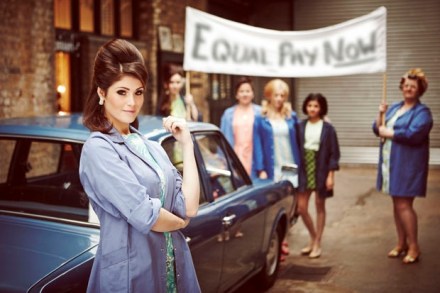Yanks buy stacks of tickets in the West End. Why is Made in Dagenham so rude to them?
Go slow at Dagenham. The musical based on the film about a pay dispute in the 1960s starts as a sluggish mire of twee simplicities. We’re in Essex. Grumbling Cockney wage slaves inhabit cramped but spick-and-span council flats. Russet-cheeked kiddiwinkies are scolded and cosseted by blousy matriarchs married to emotionally reticent beer guts. The doll’s-house infantilism of Rupert Goold’s production is challenged by designer Bunny Christie whose set is an essay in conceptualism. She uses a vast plastic grid, like an unmade Airfix kit, to suggest the Dagenham car plant. It’s ingenious and intricate but irritating too. Trouble brews at the factory when the executives downgrade the leather workers, who


















